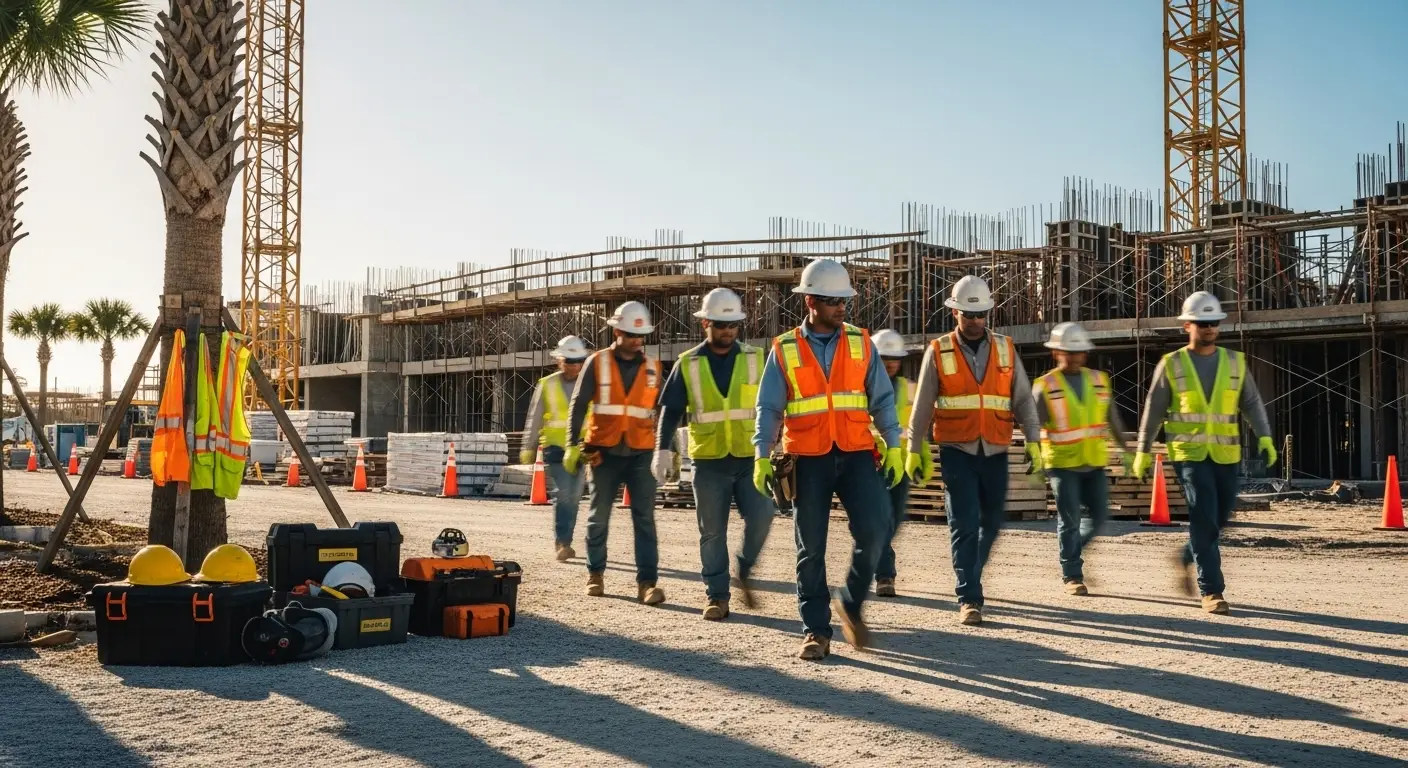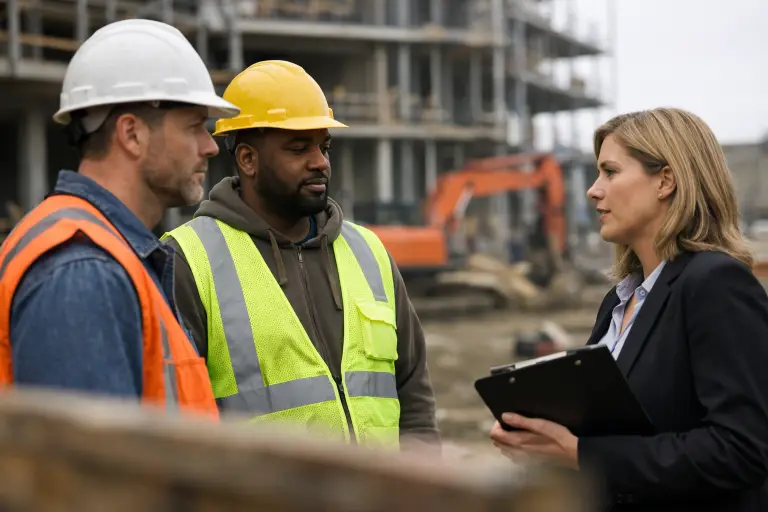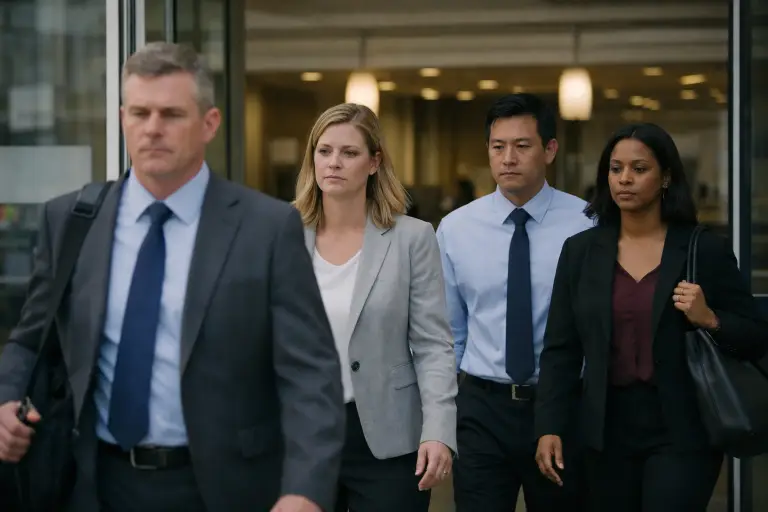Florida construction background checks are mandatory screening processes that verify criminal history, professional licenses, and workers' compensation compliance for anyone working in the state's construction industry. These comprehensive checks, regulated by the Department of Business and Professional Regulation (DBPR), serve as critical safety measures that protect employers, workers, and the public while ensuring legal compliance across all construction projects.
Key Takeaways
- Florida construction background checks include criminal history screening, professional license verification, workers' compensation compliance, and drug testing to ensure workplace safety and legal compliance.
- The DBPR oversees all background check requirements for contractors, requiring valid licenses and adherence to strict screening protocols before issuing or renewing construction licenses.
- Workers' compensation verification is non-negotiable in Florida construction, with proof of coverage required to protect both employers and employees from liability.
- Background check timelines typically range from 1-10 business days depending on the complexity of screening, with costs varying from $10-$150 based on the depth of investigation required.
- The Fair Credit Reporting Act (FCRA) governs how background checks are conducted, requiring written consent from candidates and proper disclosure of any adverse findings.
- Industry-specific variations exist for government contracts, healthcare facilities, and educational construction projects, each requiring different levels of security clearance and compliance verification.
Introduction
Navigating the construction industry in Florida requires more than technical skills and experience—it demands strict adherence to state-mandated background screening protocols that ensure workplace safety and legal compliance. These comprehensive checks serve as gatekeepers to the industry, verifying that every worker meets the stringent standards set by state regulators and industry best practices.
The Florida Department of Business and Professional Regulation (DBPR) stands at the center of this screening ecosystem, establishing and enforcing requirements that affect everyone from day laborers to licensed general contractors. Understanding these requirements isn't optional—it's essential for anyone seeking to build a career or operate a business in Florida's thriving construction sector, where compliance failures can result in hefty fines, work stoppages, and permanent license revocation.
Understanding Florida Construction Background Checks
Florida's construction industry operates under stringent safety and compliance standards that make background checks essential for maintaining workplace integrity. These screenings go beyond simple criminal record searches to encompass a comprehensive evaluation of a worker's qualifications, legal status, and professional history.
The state's approach to construction background checks reflects its commitment to building safety and professional standards. Whether you're a seasoned contractor or new to the industry, understanding these requirements helps ensure smooth project operations and legal compliance throughout your career.
DBPR's Role in Construction Background Screening
The Department of Business and Professional Regulation functions as the cornerstone of Florida's construction licensing and compliance system, wielding considerable authority over who can legally work in the state's construction industry. Through its comprehensive oversight mechanisms, the DBPR ensures that every licensed contractor meets minimum competency standards, maintains ethical business practices, and complies with ongoing regulatory requirements that protect both consumers and workers.
This regulatory framework extends beyond simple license issuance to encompass continuous monitoring of contractor activities, investigation of consumer complaints, and enforcement of disciplinary actions when violations occur. The DBPR's multifaceted approach creates a system where background checks serve not just as entry barriers but as ongoing compliance tools that maintain the integrity of Florida's construction workforce throughout their careers.
Licensing and Verification Standards
The Department of Business and Professional Regulation serves as Florida's primary authority for construction industry oversight. This state agency maintains rigorous standards for contractor licensing and ensures all construction professionals meet specific criteria before working on projects.
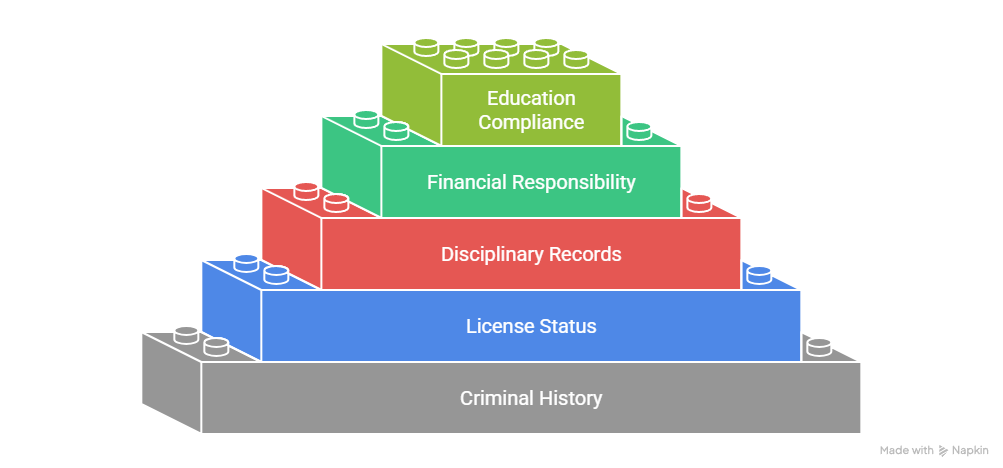
DBPR's verification process includes:
- Criminal History Review: Comprehensive state and federal database checks
- License Status Confirmation: Active license verification across all trade categories
- Disciplinary Action Records: Past violations or complaints filed against contractors
- Financial Responsibility: Verification of bonds and insurance requirements
- Continuing Education Compliance: Confirmation of required training completion
These stringent requirements help maintain the construction industry's professional standards while protecting consumers from unqualified or unethical contractors.
Enforcement and Compliance Measures
DBPR actively monitors compliance through regular audits and investigation of complaints. Contractors found operating without proper licenses or falsifying background information face severe penalties including fines up to $10,000 and potential criminal charges.
The department's online verification system at myfloridalicense.com allows instant confirmation of contractor credentials, making it easier for employers and property owners to verify qualifications before hiring.
Regular compliance audits conducted by DBPR field investigators ensure that contractors maintain required insurance coverage, adhere to continuing education requirements, and operate within their licensed scope of work. These proactive enforcement measures, combined with consumer complaint investigations and random jobsite inspections, create multiple layers of accountability that reinforce the importance of maintaining clean background records and proper credentials throughout a contractor's career.
Essential Components of Construction Background Checks
The comprehensive nature of Florida construction background checks reflects the industry's inherent risks and the state's commitment to protecting workers, property owners, and the general public from potential harm. Each component of the screening process serves a specific purpose in building a complete picture of an applicant's suitability for construction work, from verifying basic identity and work authorization to uncovering past behaviors that might indicate future risks on job sites.
Modern background screening technology allows these various checks to be conducted simultaneously through integrated platforms, significantly reducing processing times while improving accuracy. However, the depth and breadth of these investigations mean that even minor discrepancies or outdated information can trigger delays, making it crucial for construction professionals to maintain accurate records and address any potential issues proactively before beginning the application process.
Florida construction background checks comprise multiple screening elements designed to create a comprehensive worker profile. Understanding each component helps contractors and employers prepare for the screening process effectively.
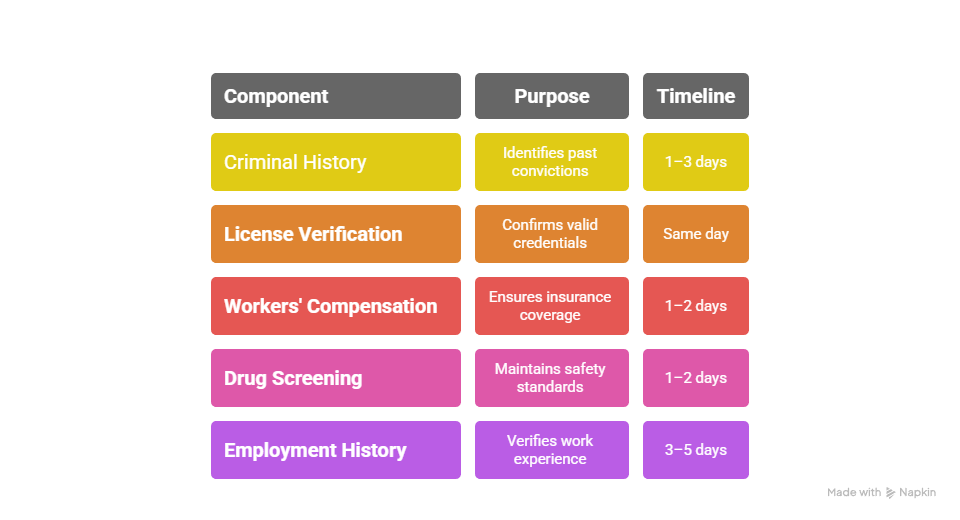
Each screening element serves a specific purpose in maintaining construction site safety and legal compliance across Florida's diverse project landscape.
Workers' Compensation Requirements
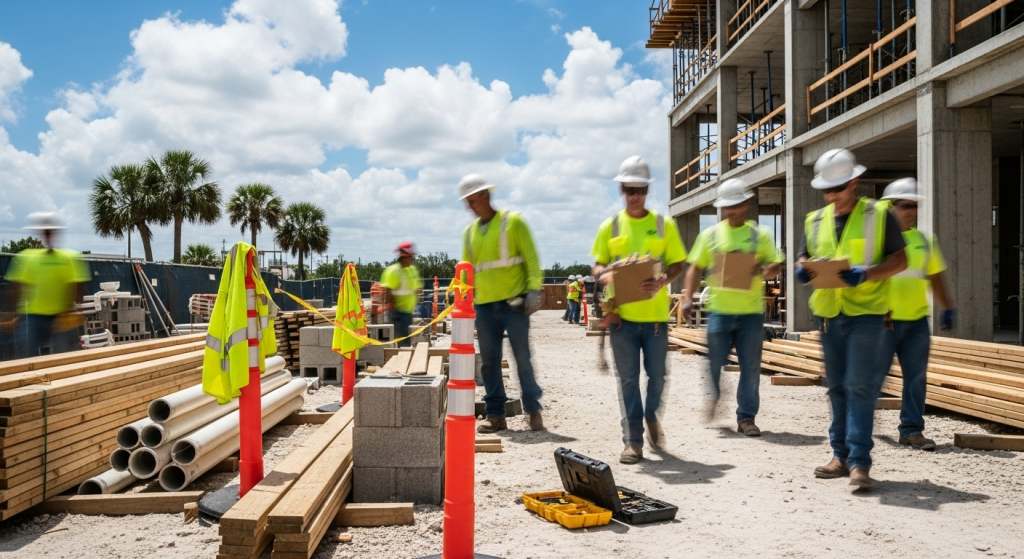
The workers' compensation system in Florida construction represents a critical social contract between employers and employees, providing essential financial protection while limiting liability exposure for all parties involved. This mandatory insurance coverage ensures that injured workers receive necessary medical treatment and wage replacement benefits without having to prove employer negligence, while employers gain protection from potentially devastating lawsuits that could arise from workplace accidents.
Florida's construction industry faces unique workers' compensation challenges due to high injury rates and the prevalence of subcontracting arrangements that can blur employer-employee relationships. The state's strict enforcement of coverage requirements, including the use of stop-work orders and criminal penalties for non-compliance, reflects the legislature's recognition that uninsured construction work poses unacceptable risks to workers, legitimate businesses, and taxpayers who ultimately bear the cost of treating uninsured injured workers.
Workers' compensation coverage represents a cornerstone of Florida construction compliance, protecting both employers and employees from financial devastation following workplace accidents. The state mandates coverage for all construction businesses with one or more employees, including part-time workers.
Coverage Verification Process
The verification process involves confirming active policies through the Florida Division of Workers' Compensation database. Contractors must provide:
- Policy Number: Active workers' compensation policy identifier
- Coverage Dates: Confirmation of current, uninterrupted coverage
- Classification Codes: Proper construction industry classifications
- Certificate of Insurance: Official documentation from the insurance carrier
Maintaining proper coverage prevents work stoppages and protects your business from costly lawsuits and penalties.
Penalties for Non-Compliance
Operating without workers' compensation in Florida construction carries severe consequences:
- Stop-Work Orders: Immediate cessation of all business operations
- Daily Fines: $1,000 per day for non-compliance
- Criminal Charges: Potential felony charges for willful violations
- Project Disqualification: Inability to bid on government or commercial projects
- License Revocation: Loss of contractor licensing privileges
These penalties underscore the critical importance of maintaining continuous coverage throughout all construction operations.
Background Check Process Timeline
Understanding the typical timeline for Florida background checks helps contractors and job seekers plan accordingly. The process varies based on screening depth and any complications that arise during verification.
Standard timeline breakdown:
- Application Submission: 1 day for gathering and submitting required documents
- Initial Criminal Screening: 1-3 days for state and county record searches
- Federal Database Check: 2-3 days for FBI and national database verification
- License Verification: Same day through DBPR online systems
- Employment Verification: 3-5 days depending on previous employer responsiveness
- Final Review and Approval: 1-2 days for comprehensive evaluation
Factors such as incomplete information, out-of-state records, or database backlogs can extend these timelines significantly.
Legal Compliance and FCRA Guidelines
The Fair Credit Reporting Act establishes strict guidelines for conducting background checks in Florida's construction industry. These federal regulations protect job applicants' rights while allowing employers to make informed hiring decisions based on relevant information.
Key FCRA requirements include:
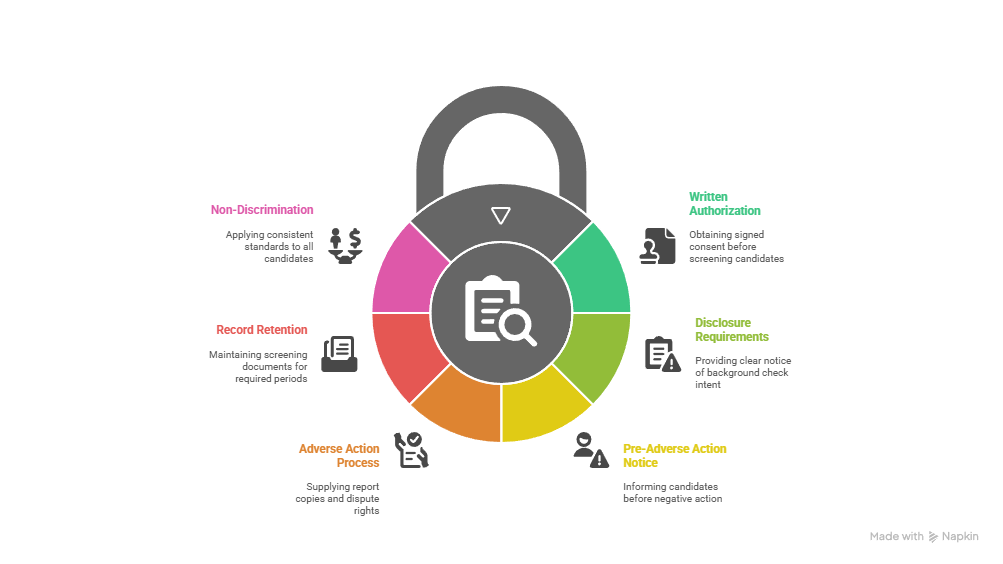
- Written Authorization: Obtain candidate's signed consent before screening
- Disclosure Requirements: Provide clear notice of background check intent
- Pre-Adverse Action Notice: Inform candidates before taking negative action
- Adverse Action Process: Supply report copies and dispute rights information
- Record Retention: Maintain screening documents for required periods
- Non-Discrimination: Apply consistent standards to all candidates
Violating FCRA provisions can result in significant penalties and lawsuits, making compliance essential for all construction employers.
Industry-Specific Screening Variations
Different construction sectors require specialized background screening protocols based on project sensitivity and regulatory requirements. Government contracts, for instance, often mandate additional security clearances beyond standard criminal checks.
| Construction Sector | Additional Requirements | Typical Processing Time |
| Government Projects | Security clearance, citizenship verification | 2-4 weeks |
| Healthcare Facilities | Healthcare exclusion lists, abuse registries | 1-2 weeks |
| Educational Projects | Sex offender registry, child abuse checks | 1 week |
Understanding these sector-specific requirements helps contractors prepare appropriate documentation and avoid project delays.
Preparing for Your Background Check
Successful navigation of Florida construction background checks requires thorough preparation and organization. Gathering necessary documents beforehand streamlines the process and prevents unnecessary delays that could impact employment opportunities.
Essential preparation steps:
- Document Collection: Gather driver's license, Social Security card, and proof of legal work authorization
- License Documentation: Compile all professional licenses, certifications, and training records
- Insurance Verification: Obtain current workers' compensation and liability insurance certificates
- Reference List: Prepare contact information for previous employers and professional references
- Criminal Record Review: Obtain personal background report to identify potential issues
- Financial Records: Organize any required financial documentation or bond information
Taking these proactive measures demonstrates professionalism and helps expedite the screening process.
Common Issues and Solutions
Background check complications can derail construction careers, but understanding common problems helps contractors address them effectively. Criminal history remains the most frequent obstacle, though not all offenses automatically disqualify candidates from construction work.
Criminal Record Considerations
Florida construction employers evaluate criminal records based on:
- Offense Relevance: How the crime relates to construction duties
- Time Elapsed: Years since conviction or completion of sentence
- Rehabilitation Evidence: Certificates, training, or character references
- Offense Severity: Misdemeanors versus felonies
- Pattern of Behavior: Single incident versus repeated offenses
Candidates with criminal histories should prepare explanations and rehabilitation evidence to support their applications.
License and Certification Problems
License issues create immediate barriers to construction employment. Common problems and solutions include:
- Expired Licenses: Renew immediately through DBPR online portal
- Out-of-State Licenses: Apply for reciprocity or Florida endorsement
- Disciplinary Actions: Address violations and complete required remediation
- Missing Documentation: Contact issuing authorities for replacement certificates
- Name Discrepancies: Provide legal name change documentation
Resolving these issues before applying prevents screening delays and demonstrates professional responsibility.
Cost Considerations for Background Screening
Background check costs vary significantly based on screening depth and provider selection. Understanding typical pricing helps contractors and employers budget appropriately for these essential compliance measures.
Basic screening packages typically include:
- County Criminal Search: $10-25 per jurisdiction
- State Criminal Database: $15-30
- Federal Criminal Search: $25-50
- License Verification: $10-20
- Employment Verification: $15-25 per employer
Comprehensive packages combining all elements range from $75-150, with bulk discounts available for employers screening multiple candidates.
Conclusion
Florida construction background checks represent more than bureaucratic requirements—they embody the industry's commitment to safety, professionalism, and legal compliance. Understanding DBPR requirements, maintaining proper workers' compensation coverage, and preparing thoroughly for screenings positions construction professionals for success in Florida's competitive market. Whether you're an employer safeguarding your business or a worker advancing your career, embracing these screening processes demonstrates your dedication to construction excellence. By staying informed about evolving requirements and maintaining compliance documentation, you contribute to Florida's reputation for quality construction and workplace safety.
Frequently Asked Questions
What components are included in a Florida construction background check?
A Florida construction background check typically includes criminal history screening at county, state, and federal levels, professional license verification through DBPR, workers' compensation compliance confirmation, drug and alcohol testing, employment history verification, and immigration status documentation.
How long does a Florida construction background check take to complete?
Most Florida construction background checks complete within 3-5 business days for standard screenings. However, comprehensive checks involving federal databases, out-of-state records, or security clearances can extend to 2-4 weeks depending on complexity and agency response times.
Does Florida follow the 7-year rule for reporting criminal history?
Florida does not impose a 7-year limitation on reporting criminal convictions in background checks. Under the Fair Credit Reporting Act, criminal convictions can be reported indefinitely, though some non-conviction information may have time restrictions.
What disqualifies someone from passing a Level 2 background check in Florida?
Level 2 background check disqualifiers include serious offenses such as sexual crimes, murder, kidnapping, aggravated assault, and crimes against children or vulnerable adults. The specific list of disqualifying offenses is outlined in Florida Statute 435.04.
Are background checks required for all construction jobs in Florida?
While not legally mandated for all positions, most Florida construction employers conduct background checks as standard practice. Government contracts, licensed contractor positions, and projects in sensitive locations like schools or healthcare facilities always require comprehensive screening.
Can employers deny employment based solely on criminal history?
Employers can consider criminal history in hiring decisions but must evaluate the nature of the offense, its relevance to the construction position, time elapsed since conviction, and evidence of rehabilitation. Blanket policies excluding all applicants with criminal records may violate employment discrimination laws.
What should I do if my background check contains errors?
If you discover errors in your background check, immediately dispute the information with both the screening company and the source of the incorrect data. The FCRA requires investigation of disputes within 30 days, and you're entitled to receive corrected reports at no charge.
How much do Florida construction background checks cost?
Basic Florida construction background checks range from $10-50 for simple criminal searches, while comprehensive packages including all required components typically cost $75-150. Employers often negotiate volume discounts for screening multiple employees.
Do Florida construction background checks include credit reports?
Credit reports are not standard components of construction background checks unless the position involves financial responsibilities, bonding requirements, or access to company funds. When included, employers must comply with additional FCRA disclosure requirements.
What's the difference between Level 1 and Level 2 background checks?
Level 1 checks include state criminal history and employment verification, while Level 2 checks add federal criminal databases and fingerprint-based FBI searches. Level 2 screenings are required for positions working with vulnerable populations or in high-security environments.
Additional Resources
- Florida Department of Business and Professional Regulation - Official Licensing Portal
https://www.myfloridalicense.com - Florida Division of Workers' Compensation - Coverage Verification
https://www.myfloridacfo.com/division/wc - Fair Credit Reporting Act - Complete Text and Guidelines
https://www.ftc.gov/legal-library/browse/statutes/fair-credit-reporting-act - Florida Construction Industry Licensing Board - Requirements and Applications
https://www.myfloridalicense.com/DBPR/construction-industry - OSHA Construction Safety Standards - Federal Requirements
https://www.osha.gov/construction - Florida Statute Chapter 489 - Contracting Regulations
http://www.leg.state.fl.us/statutes/index.cfm?App_mode=Display_Statute&URL=0400-0499/0489/0489.html

GCheck Editorial Team
Meet the GCheck Editorial Team, your trusted source for insightful and up-to-date information in the world of employment background checks. Committed to delivering the latest trends, best practices, and industry insights, our team is dedicated to keeping you informed.
With a passion for ensuring accuracy, compliance, and efficiency in background screening, we are your go-to experts in the field. Stay tuned for our comprehensive articles, guides, and analysis, designed to empower businesses and individuals with the knowledge they need to make informed decisions.
At GCheck, we're here to guide you through the complexities of background checks, every step of the way.
